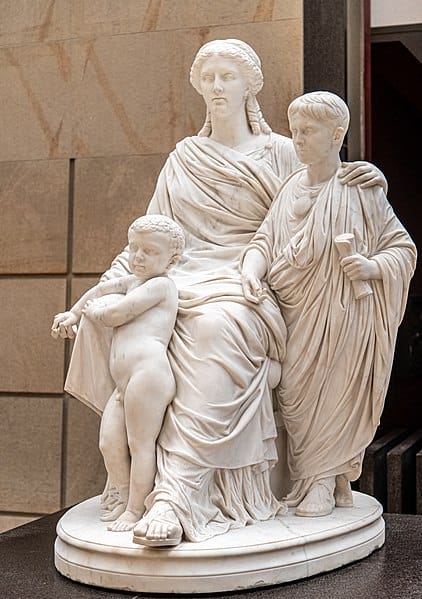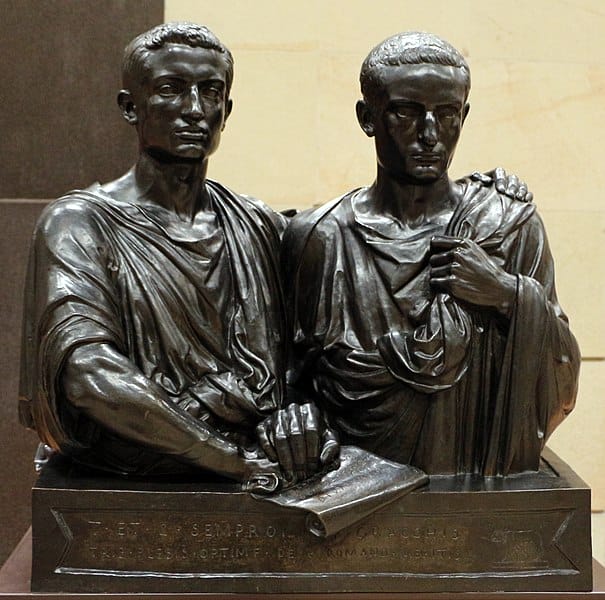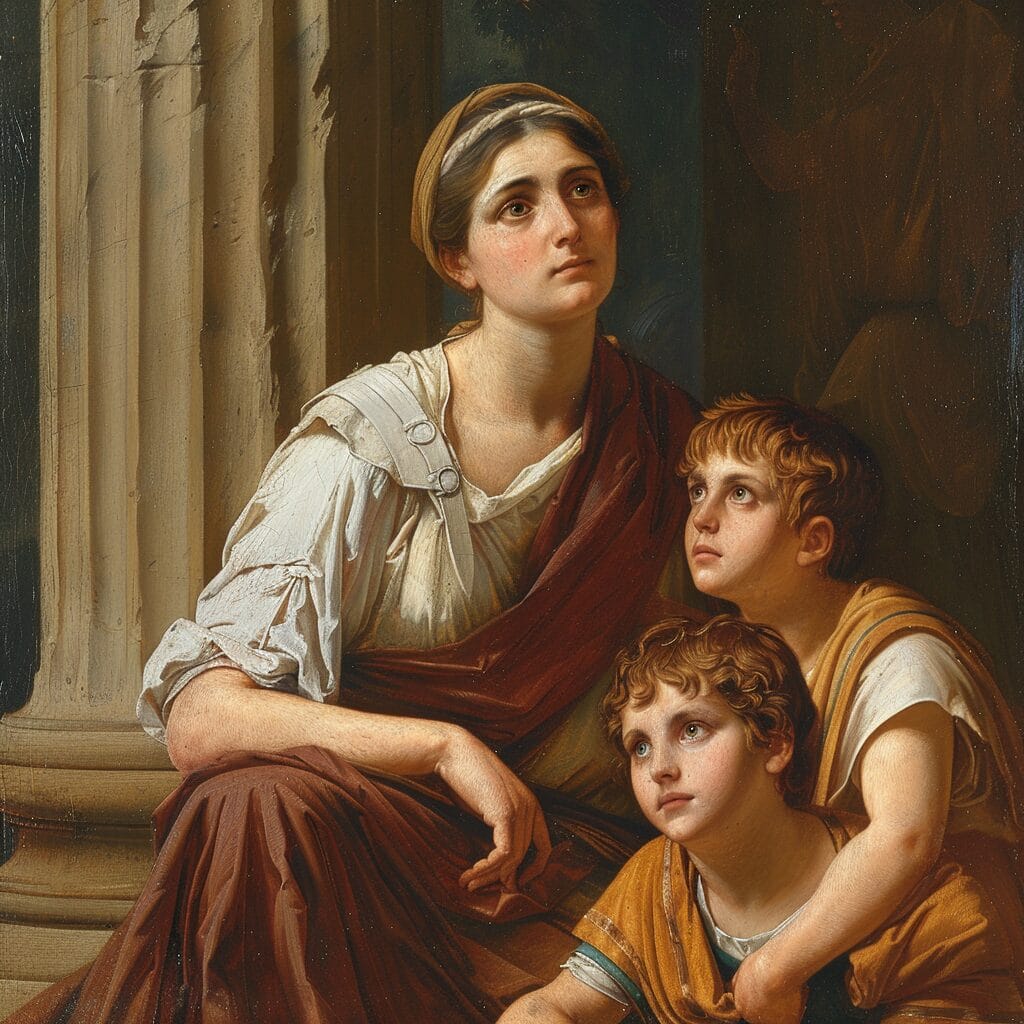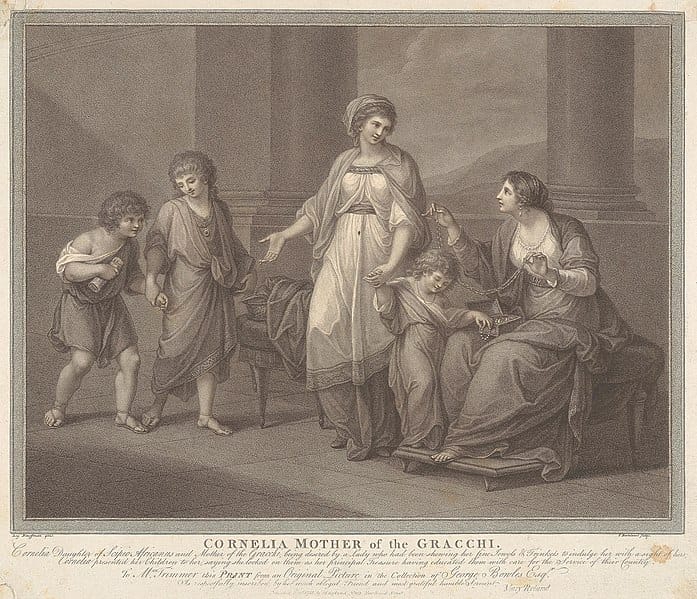Cornelia Africana, a name steeped in the annals of ancient Rome, was a storied figure known not only for her lineage but also for the virtues she personified. She was the daughter of Publius Cornelius Scipio Africanus, the famed Roman general and hero of the Second Punic War, and Aemilia Paulla. Her role in Roman society transcended mere familial connections; she became the paradigm of Roman womanhood, esteemed for her stoicism, managerial skill in handling familial affairs, and her embodiment of traditional Roman values.
Widowed at a young age, Cornelia Africana’s life was defined by her role as a devoted mother to her two sons, Tiberius and Gaius Gracchus, who would go on to leave significant marks on Roman history as reformists. However, her influence extended beyond her immediate family. Through her extensive correspondence with major figures of her day, Cornelia exerted a subtle but meaningful influence on politics and social customs. Her legacy, enriched by the memorialization through texts and sculptures, transcends time, underscoring her status as a matron of both her family and the broader Roman society.

Source: Michael Gaylard from Horsham, UK, CC BY 2.0 https://creativecommons.org/licenses/by/2.0, via Wikimedia Commons
Key Takeaways
- Cornelia Africana is celebrated for her virtues and her role as a symbol of Roman womanhood and maternal devotion.
- She greatly influenced her sons, Tiberius and Gaius Gracchus, who were notable for their efforts in Roman social and political reform.
- Cornelia’s legacy is preserved through various forms of commemoration that honor her contributions to Roman culture and society.
Early Life and Family
Cornelia Africana stands as a testament to the resonating legacy of Roman patrician families, embodying the virtues expected of a Roman lady. Her life unfolds a narrative of lineage, duty, and maternal devotion within one of Rome’s most distinguished houses.
Parentage and Siblings
Cornelia was the second daughter of Publius Cornelius Scipio Africanus, the esteemed Roman general who defeated Hannibal at the Battle of Zama, and Aemilia Paulla, a matron from the influential Aemilii family. She grew up alongside her siblings in an environment that was steeped in the traditions of Rome’s elite.
Marriage and Children
In her marriage to Tiberius Sempronius Gracchus, a prominent consul and censor, she bore twelve children. The most notable among them were Tiberius and Gaius Gracchus, who would become renowned historical figures as reformers and tribunes. Her role as a mother, particularly after her widowhood, was significant in shaping her children’s lives, as evidenced by her profound influence on them both personally and politically. Her guidance cemented the family’s enduring influence in Roman society.
Matronly Model
She is often esteemed as the quintessential Roman lady. Her portrayal within Roman history is one of a woman who consistently upheld and epitomized the moral and ethical benchmarks of Roman standards. As a widow, she devoted herself to her family; her dedication to her children, particularly Tiberius Gracchus and Gaius Gracchus, showed an exceptional commitment to their upbringing and moral development, aligning with the societal expectations of Roman women of her status.

Source: Sailko, CC BY 3.0 https://creativecommons.org/licenses/by/3.0, via Wikimedia Commons
Educational Advocate
She fervently championed education, understanding its pivotal role in preparing her children for public life. Cornelia’s insistence on high-quality education for her children ensured that they were well-versed in both Greek and Roman thought, understanding the intricacies of political matters as well as philosophy. Her advocacy and emphasis on learning set a powerful example, suggesting that education was not only for the elite but a necessary tool for those aspiring to leadership and influence.
Political Interactions
Although a woman in ancient Rome was traditionally excluded from formal political roles, Cornelia exerted considerable influence in political interactions through her support and advice. She cultivated a network of allies and used her position to support her son’s career. Cornelia’s interactions often aimed at advancing reforms and policies that her family endorsed, reflecting the complex ways women could engage with the politics of their time without holding any direct political role themselves. Her support and model as a mother ultimately became an intrinsic part of the legacy of the Gracchi brothers and their progressive ideas within Roman society.

Legacy and Memorials
Cornelia Africana’s legacy is engraved in history through various forms of cultural depictions and historical accounts. Her image as a symbol of Roman virtue is preserved in artwork and literature, while modern recognition affirms her influence across generations.
Cultural Depiction
Cornelia Africana has been immortalized in numerous artistic works as the mother of the Gracchi brothers. Notable among them is a painting by Angelica Kauffman, which skillfully captures Cornelia’s elegance and strength. The public domain piece echoes the tale of when Cornelia referred to her sons as her most precious “jewels.”

Historical Accounts
Records penned by classical historians like Cicero, Plutarch, and Cornelius Nepos have solidified Cornelia’s place in history. They depict her not only as the daughter of Scipio Africanus but also as a paradigm of rectitude and matronly honor. The narratives praise her for prioritizing her children’s upbringing over material wealth, underscoring her esteemed status in Roman society.
Modern Recognition
A modern homage to Cornelia Africana is evident in the preservation and display of her likenesses. A marble statue of Cornelia can be found in a museum in London, where it stands as a testament to her enduring legacy. This venue offers a tangible connection to the ancient past where visitors can appreciate her significance. Cornelia’s story continues to inspire and resonate, affirming her as a powerful figure of matronly virtue and familial dedication.
Cornelia’s Correspondence
Cornelia Africana, revered in Roman history as a paragon of virtue and intelligence, was also a prolific correspondent. Her letters were key in revealing the matron’s role in intellectual circles and the political landscape of her time.
Letters to Notable Romans
Cornelia Africana’s correspondence with prominent Romans underscores her role as a central figure in the social and intellectual realms. She wrote letters in which she often infused her knowledge of Latin and Greek literature, a testament to her learned status. These letters, crafted by a Roman woman adept at writing and steeped in culture, reflect her sharp intellect and the respect she held among her contemporaries.
Intellectual Legacy
Cornelia’s letters were not only personal communications; they formed a significant part of her intellectual legacy. Although few specifics of her letters survive, it is known that Cornelia’s writings circulated among the educated elite, influencing literature and the perception of women’s roles in Roman society. Through her well-articulated thoughts and ideas, she proved to be an intelligent woman who was both learned and influential, expanding the boundaries of how a Roman woman was traditionally perceived.
Tragedy
Tiberius and Gaius Gracchi were assassinated by their political opponents. After Tiberius’s death, Cornelia tried to save Gaius when his life was in danger, but it was futile. Both of her sons were killed because their plans to aid Rome’s poor angered many powerful Romans. Cornelia honored the memory of her deceased children and husband. In her later years, she retired to her family villa. Despite this, she stayed active in society, maintaining friendships and frequently corresponding with distinguished men.
People Also Ask:
This section answers common inquiries about Cornelia Africana, highlighting her family ties, her legacy, the impact of her offspring, and her representation in culture.
Who was the husband of Cornelia Africana and what was his significance?
Cornelia Africana was married to Tiberius Sempronius Gracchus, a significant figure in Roman history for his role as a consul and for his achievements in foreign conquest and domestic politics.
What is Cornelia Africana most remembered for in Roman history?
In Roman history, Cornelia Africana is most remembered for being the mother of the Gracchi brothers, Tiberius and Gaius, two reformers who sought social and political changes within the Roman Republic.
How did the actions of Cornelia Africana’s sons impact the Roman Republic?
The actions of Cornelia Africana’s sons, particularly their advocacy for agrarian reform and the redistribution of public land to the poor, sparked significant social and political reforms, leading to both widespread support and opposition which had lasting effects on the Roman Republic.
What are the notable traits and virtues attributed to Cornelia Africana?
Cornelia Africana is attributed to virtues such as wisdom, eloquence, and maternal dedication. She was also highly regarded for her management of her household and the education of her children, setting a standard for Roman matronly virtues.
In what ways did Cornelia Africana influence the political landscape of her time?
Although women in ancient Rome had limited formal political power, Cornelia Africana influenced the political landscape through her role as an advisor and by shaping the characters and policies of her sons, who became significant political figures.
How has Cornelia Africana been represented in art and literature through the ages?
Through the ages, Cornelia Africana has been represented in art and literature as an exemplar of Roman femininity and virtue, often depicted in the role of the ideal matron and mother. Her figure is featured in various historical and artistic works, reinforcing her place in cultural memory.
Hello, my name is Vladimir, and I am a part of the Roman-empire writing team.
I am a historian, and history is an integral part of my life.
To be honest, while I was in school, I didn’t like history so how did I end up studying it? Well, for that, I have to thank history-based strategy PC games. Thank you so much, Europa Universalis IV, and thank you, Medieval Total War.
Since games made me fall in love with history, I completed bachelor studies at Filozofski Fakultet Niš, a part of the University of Niš. My bachelor’s thesis was about Julis Caesar. Soon, I completed my master’s studies at the same university.
For years now, I have been working as a teacher in a local elementary school, but my passion for writing isn’t fulfilled, so I decided to pursue that ambition online. There were a few gigs, but most of them were not history-related.
Then I stumbled upon roman-empire.com, and now I am a part of something bigger. No, I am not a part of the ancient Roman Empire but of a creative writing team where I have the freedom to write about whatever I want. Yes, even about Star Wars. Stay tuned for that.
Anyway, I am better at writing about Rome than writing about me. But if you would like to contact me for any reason, you can do it at contact@roman-empire.net. Except for negative reviews, of course. 😀
Kind regards,
Vladimir
